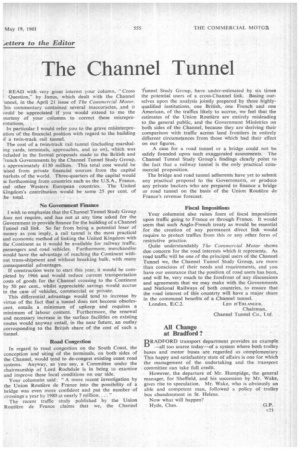Jetters to the Editor
Page 59

If you've noticed an error in this article please click here to report it so we can fix it.
The Channel Tunnel
' READ with very great interest your column, "Cross L Question," by Janus, which dealt with the Channel "unnel, in the April 21 issue of The Commercial Motor. "his commentary contained several inaccuracies, and it vould be appreciated if you would extend to me the ourtesy of your columns to correct these misrepreentations.
In particular I would refer you to the grave misinterpreation of the financial position with regard to the building of a twin-track rail tunnel.
The cost of a twin-track rail tunnel (including marshaling yards, terminals, approaches, and so on), which was ncluded in the formal• proposals made to the British and =Tench Governments by the Channel Tunnel Study Group, s approximately £130 million. • This total cost would be .aised from private financial sources from the capital narkets of the world. Three-quarters of the capital would >e forthcoming from countries such as the U.S.A., France. md other Western European countries. The United Kingdom's contribution would be some 25 per cent, of he total.
No Government Finance
I wish to emphasize that the Channel Tunnel Study Group Joes not require, and has not at any time asked for the Government to provide finance for the building of a Channel runnel rail link. So far from being a potential loser of money as you imply, a rail tunnel is the most practical and economic method of linking the United Kingdom with the Continent as it would be available for railway traffic. passengers and road vehicles. Furthermore, merchandise would have the advantage of reaching the Continent without trans-shipment and without breaking bulk, with many consequential advantages.
If construction were to start this year, it would be completed by 1966 and would reduce current transportation costs of goods for the Channel crossing to the Continent by 50 per cent., whilst appreciable savings would accrue in the case of vehicles, commercial or private.
This differential advantage would tend to increase by virtue of the fact that a tunnel does not become obsolescent, entails a minimum of upkeep and requires a minimum of labour content. Furthermore, the renewal and necessary increase in the surface facilities on existing routes would anyway entail, in the near future, an outlay corresponding to the British share of the cost of such a tunnel.
Road Congestion
In regard to road congestion on the South Coast, the conception and siting of the terminals, on both sides of the Channel, would tend to de-congest existing coast road systems. Anyway, as you say, a Committee under the chairmanship of Lord Rochdale is in being to examine and improve these focal conditions on our side.
Your columnist said : "A more recent investigation by the Union Routiere de France into the possibility of a bridge was even more confident and put the number of crossings a year by 1980 at nearly 7 million...."
The recent traffic study published by the Union Routiere de France claims that we, the Channel
11(unnel Study Group, have under-estimated by six times the potential users of a cross-Channel link. Basing ourselves upon the analysis jointly prepared by three highlyqualified institutions, one British, one French and one American, of the traffics likely to accrue, we feel that the estimates of the Union Routiere are entirely misleading to ,the general public, and the Government Ministries on both sides of the Channel, because they are deriving their comparison with traffic across land frontiers in entirely different circumstances from those which had their effect on our figures.
A case for a road tunnel or a bridge could not be safely founded upon such exaggerated assessments. The Channel Tunnel Study Group's findings clearly point to the fact that a railway tunnel is the only practical commercial proposition.
The bridge and road tunnel adherents have yet to submit any practical proposal to the Governments, or produce any private backers who are prepared to finance a bridge or road tunnel on the basis of the Union Routiere de France's revenue forecast.
Fiscal Impositions
Your columnist also raises fears of fiscal impositions upon traffic going to France or through France. It would seem that such Anglo-French treaty as would be essential for the creation of any permanent direct link would require to protect traffics from this or any other form of restrictive practice.
Quite understandably The Commercial Motor shows due concern for the road interests which it represents. As road traffic will be one of the principal users of the Channel Tunnel we, the Channel Tunnel Study Group, are more than conscious of their needs and requirements, and you have our assurance that the position of road users has been, and will be, very much to the forefront of any discussions and agreements that we may make with the Governments and National Railways of both countries, to ensure that the road interest of this countrty will have a major share in the communal benefits of a Channel tunnel.
London, E.C.2. LEO D. ERLANGrit.
Chairman..
Channel Tunnel Co., Ltd.
All Change at Bradford ?
BRADFORD transport department provides an example
—all too scarce today—of a system where both trolley buses and motor buses are regarded as complementary This happy and satisfactory state of affairs is one for which the management of the undertaking and the transport committee can take full credit.
However, the departure of Mr. Humpidge, the general manager, for Sheffield, and his succession by Mr. Wake, gives rise to speculation. Mr. Wake, who is obviously an able and competent man, followed a policy of trolley bus abandonment in St. Helens.
Now what will happen?
Hyde, Ches.




























































































































